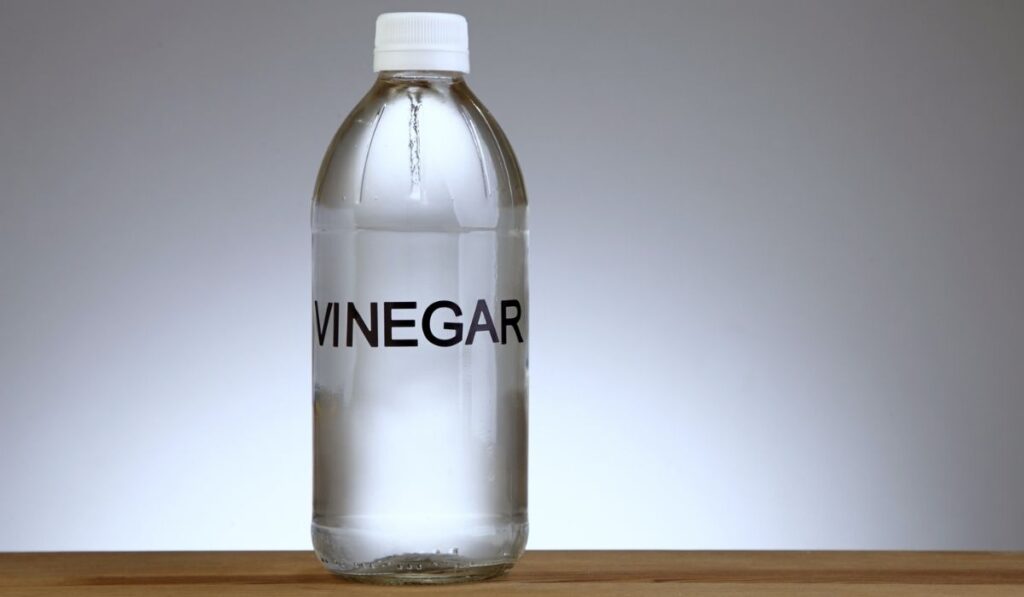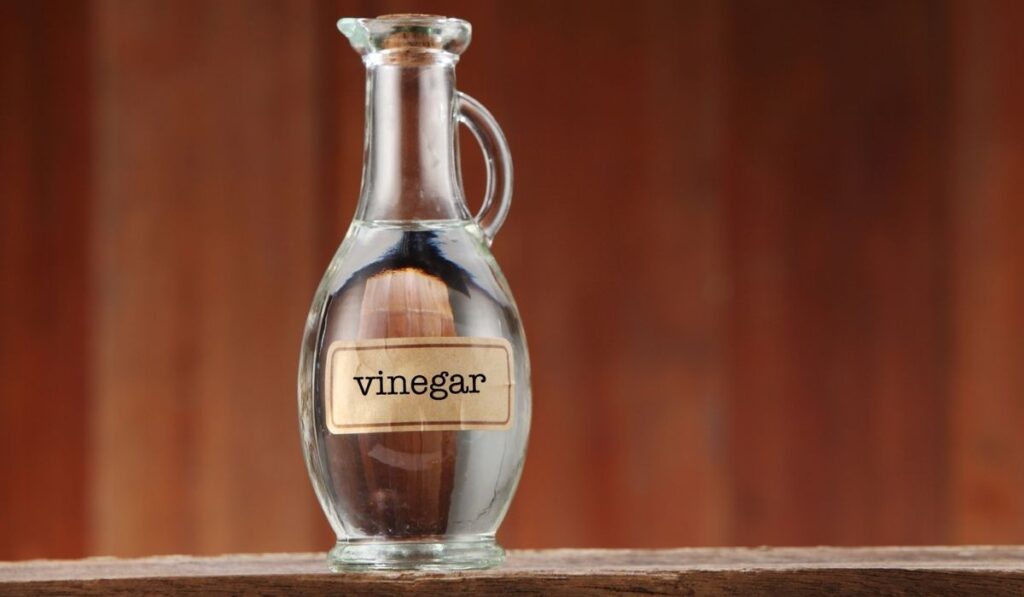Although apple cider vinegar is commonly used for its teeth whitening abilities, white vinegar shouldn’t necessarily be used in the same way. White vinegar has the potential to bleach your teeth, but it can also cause damage, especially if it’s not diluted properly.
Due to its highly acidic nature, white vinegar can erode tooth enamel and increase your risk of tooth decay and cavities. If you do rinse with a white vinegar-based solution, make sure it’s diluted properly and that you rinse your mouth again with water afterward.
Researchers say vinegar can be used to whiten your teeth, but a white smile isn’t necessarily worth the potential health effects of using this product. Let’s look a little closer at vinegars effects on both the teeth directly, and on the chemical situation in the mouth that vinegar contributes to which can have a worse effect on teeth over time.
Does White Vinegar Damage Your Teeth?

White vinegar, like this example from Avo (on amazon), is a simple solution that normally contains about 93-96% water and 4-7% acetic acid.
Sometimes, white vinegar may contain up to 20% acetic acid. People use these highly concentrated types of vinegar for cleaning and agricultural purposes. They are never intended for human use.
In some other instances, white vinegar is made from the fermentation of sugar beets, potatoes, milk whey, or molasses. Nowadays, white vinegar is usually made from the fermentation of grain alcohol.
The basic purpose of white vinegar is cleaning, but exposing your teeth to white vinegar can erode the enamel in a short time. The erosion of the enamel, in turn, increases the risk of tooth decay and the development of cavities.
Research has shown that white vinegar can have a bleaching effect on teeth. But at the same time, it can cause serious damage to your teeth’s surface. This is especially true when the vinegar is in an undiluted state.
Is White Vinegar Safe for Human Consumption?
The challenge with the use of white vinegar is that it is often confused with apple cider vinegar, which is less harmful. Additionally, some white vinegar has a much higher acidic content, about 20%, compared with other types that have less than 7%.
The white vinegar with higher acidic content should never be used for human consumption. They are designed for cleaning or industrial and agricultural uses.
Before you consider using white vinegar, you must know the purpose. Checking the label is critical to avoid using the vinegar fermented from sugar beets, potatoes, milk whey, or molasses for mouth washing.
The vinegar with a less acidic content is generally safe to use or consume. But using the wrong white vinegar in your mouth could lead to serious health issues affecting your throat and stomach. Even the less acidic vinegar should always be diluted before use.
Excessive use of vinegar can cause upper gastrointestinal tract issues such as indigestion, heartburn, and other inflammatory conditions. Using vinegar is also associated with nausea and acid reflux.
White vinegar is more harmful than the common apple cider vinegar because of its acidic nature. It is essentially used as a whitener and must be avoided for use on delicate human parts since it has been linked with disorders in the throat or stomach.
Does White Vinegar Have Any Health Benefits?
It is essential to note that white vinegar is not all bad news. It also has some health benefits. White vinegar helps in blood sugar control, as it has been scientifically found to reduce insulin and blood sugar levels.
In the same vein, white vinegar increases fullness while slowing the rate at which you feel stomach emptiness. This limits calorie intake and helps with weight loss.
Research on the cause-and-effect relationship of white vinegar revealed that it helps to reduce cholesterol. In the same research, white vinegar has proven to contain antimicrobial properties and could treat physical ailments such as warts, nail fungus, and ear infections. It can also treat burns and skin infections.
Can You Use White Vinegar as a Mouth Rinse?

Because of the common use of apple cider vinegar to clean the mouth and get rid of bad breath, people are also attempting to use white vinegar for the same purpose. But white vinegar must never be used undiluted, especially in the mouth. Otherwise, it will erode the enamel.
White vinegar, especially in an undiluted form, can harm your digestive system and mouth. It is dangerous for unregulated adult use; thus, it is extremely dangerous for children’s use.
The acetic acid content of vinegar needs to be diluted if you want to use it as a mouth rinse. You can use two tablespoons of vinegar to one cup of water. Gargle for about 30 seconds before spitting the mixture out, and then rinse again with water to clean out your mouth.
Does White Vinegar Help Your Gums?
The gums cannot be separated from the teeth. While there is no scientific evidence that white vinegar is bad for your gums, anecdotal evidence suggests that many experience a light tingling or burning at, and while it’s probably not a big deal, rinsing your mouth with a dilute acid and feeling a burning sensation probably doesn’t mean something super healthy is going on.
And in the case of white vinegar, where the acid is a bit stronger, it shifts the chemistry in your mouth to an environment which is on average more acidic (until your saliva restores a balance naturally). This is unlike apple cider vinegar, which has been shown to promote gum health and ensure a pH balance in the mouth, alongside other health benefits.
A higher risk of tooth decay and sensitivity comes with longer exposure to white vinegar. And the damage done by white vinegar is irreversible. But, the effects also aren’t instant. So as long as you pay attention and make sure to rinse your mouth out to restore the natural pH balance faster, you’ll be good to go.


